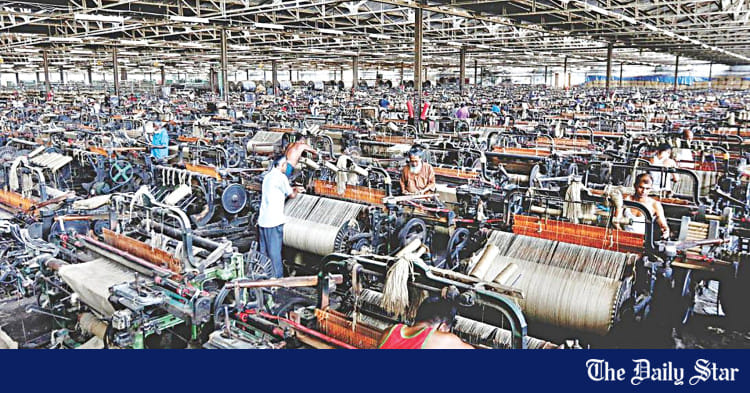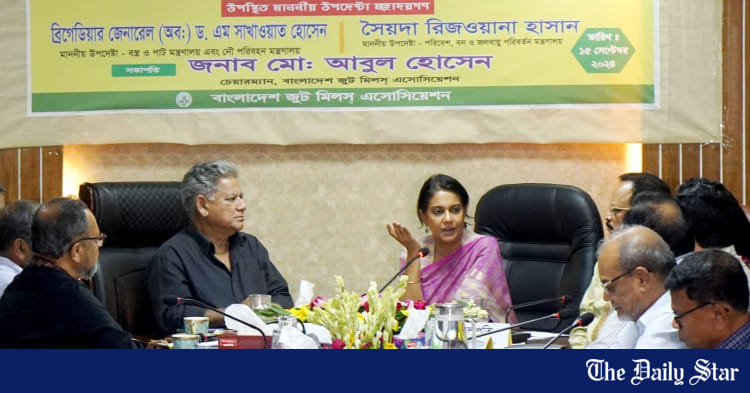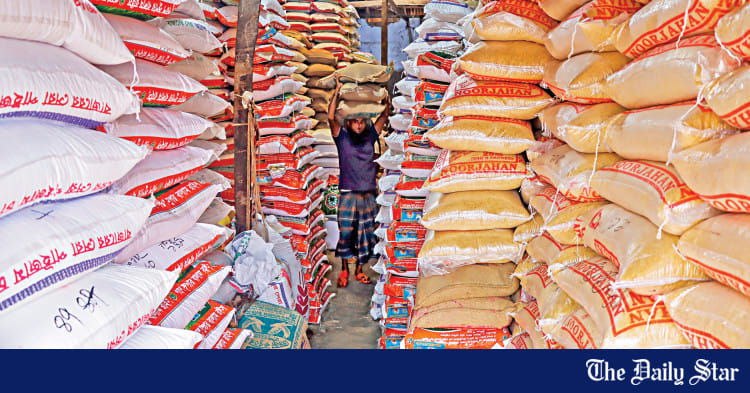Saif
Senior Member
- Joined
- Jan 24, 2024
- Messages
- 17,281
- Likes
- 8,334
- Nation

- Residence

- Axis Group


BJMC is still incurring losses!
Government must overhaul the jute sector, revive its past glory
BJMC is still incurring losses!
Government must overhaul the jute sector, revive its past glory

VISUAL: STAR
It is surprising that more than four years after the Awami League government closed the 25 state-run jute mills, the Bangladesh Jute Mills Corporation (BJMC) is still counting losses for them. According to a report by Prothom Alo, in FY 2023-24, the corporation incurred a loss of over Tk 180 crore, while over Tk 137 crore was spent on salaries and allowances for employees who are sitting idle. For instance, the Demra-based Latif Bawani Jute Mills Limited, which was shut down in July 2020, is still having to pay its 184 staff members. A similar situation prevails in other closed jute mills. The question is, why has the BJMC failed to take a decision about its idle workforce in all these years?
Back in 2020, the government had promised that all the mills would be reopened after equipping them with modern technologies under different types of ventures such as public-private partnership, etc. It also promised to give jobs to the laid-off workers once the mills reopened. However, we have not seen any such initiatives since. What BJMC did instead was that it leased out 14 of the 25 mills to different private organisations. Unfortunately, half of them reportedly do not even have the expertise to run such facilities, and therefore couldn't start their production. On what basis were those mills leased out then? Also, isn't leasing them out to private entities without modernising them a clear breach of the government promise?
Given the worldwide demand for jute-based products and the potential of this sector within the country, we think the interim government should take urgent initiatives to revive this sector. Of course, if needed, the government can work together with private institutions but there is no alternative to revamping the BJMC so that it can take the lead in this regard. This would also create job opportunities for thousands of workers including those who used to work in the sector and are now living in dire conditions.
Reviving the sector is all the more important because of the global campaign to reduce the use of plastic products. Bangladesh can be a part of this drive by rejuvenating the sector since jute-based products can actually be a great alternative to plastic goods and bags. Our scientists have invented some jute-based products, such as the biodegradable Sonali Bag, which has a great potential. However, we have not succeeded in popularising them due to the reluctance of the relevant authorities. Such attitudes must change.
About the idle BJMC workforce, we think the government should take a quick decision about transferring them to other government factories or institutions. Another option is to let go of these officials by paying them their dues since the BJMC should not be incurring such huge losses year after year. However, the government's long-term goal should be to completely overhaul the BJMC and the jute sector so that the latter can make profits again.
Government must overhaul the jute sector, revive its past glory
VISUAL: STAR
It is surprising that more than four years after the Awami League government closed the 25 state-run jute mills, the Bangladesh Jute Mills Corporation (BJMC) is still counting losses for them. According to a report by Prothom Alo, in FY 2023-24, the corporation incurred a loss of over Tk 180 crore, while over Tk 137 crore was spent on salaries and allowances for employees who are sitting idle. For instance, the Demra-based Latif Bawani Jute Mills Limited, which was shut down in July 2020, is still having to pay its 184 staff members. A similar situation prevails in other closed jute mills. The question is, why has the BJMC failed to take a decision about its idle workforce in all these years?
Back in 2020, the government had promised that all the mills would be reopened after equipping them with modern technologies under different types of ventures such as public-private partnership, etc. It also promised to give jobs to the laid-off workers once the mills reopened. However, we have not seen any such initiatives since. What BJMC did instead was that it leased out 14 of the 25 mills to different private organisations. Unfortunately, half of them reportedly do not even have the expertise to run such facilities, and therefore couldn't start their production. On what basis were those mills leased out then? Also, isn't leasing them out to private entities without modernising them a clear breach of the government promise?
Given the worldwide demand for jute-based products and the potential of this sector within the country, we think the interim government should take urgent initiatives to revive this sector. Of course, if needed, the government can work together with private institutions but there is no alternative to revamping the BJMC so that it can take the lead in this regard. This would also create job opportunities for thousands of workers including those who used to work in the sector and are now living in dire conditions.
Reviving the sector is all the more important because of the global campaign to reduce the use of plastic products. Bangladesh can be a part of this drive by rejuvenating the sector since jute-based products can actually be a great alternative to plastic goods and bags. Our scientists have invented some jute-based products, such as the biodegradable Sonali Bag, which has a great potential. However, we have not succeeded in popularising them due to the reluctance of the relevant authorities. Such attitudes must change.
About the idle BJMC workforce, we think the government should take a quick decision about transferring them to other government factories or institutions. Another option is to let go of these officials by paying them their dues since the BJMC should not be incurring such huge losses year after year. However, the government's long-term goal should be to completely overhaul the BJMC and the jute sector so that the latter can make profits again.







































